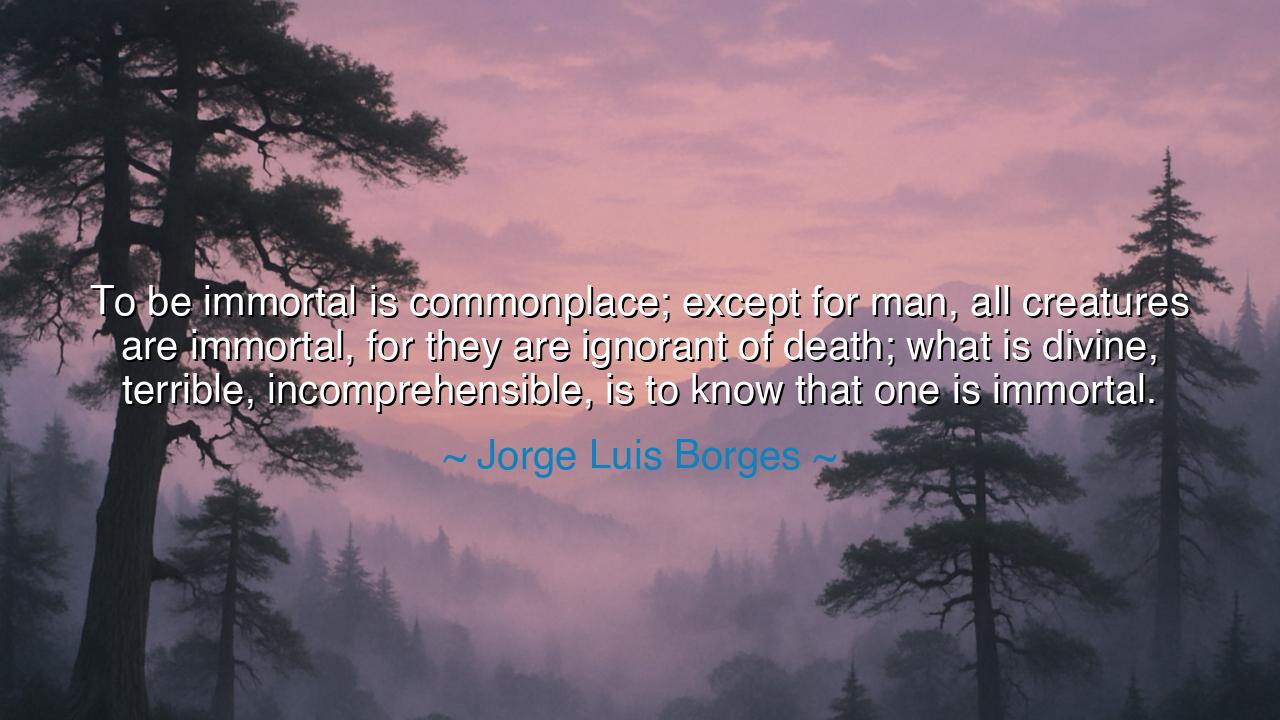
To be immortal is commonplace; except for man, all creatures are
To be immortal is commonplace; except for man, all creatures are immortal, for they are ignorant of death; what is divine, terrible, incomprehensible, is to know that one is immortal.






“To be immortal is commonplace; except for man, all creatures are immortal, for they are ignorant of death; what is divine, terrible, incomprehensible, is to know that one is immortal.” Thus spoke Jorge Luis Borges, the blind sage of Buenos Aires, whose words open doorways between philosophy and dream. In this sentence—so brief yet boundless—Borges unfolds a mystery that has haunted humankind since the dawn of thought: the paradox of consciousness, the divine burden of knowing one’s own mortality, and the terrible wonder of imagining oneself beyond it. Beneath his calm tone lies the cry of a prophet who saw in our awareness both our suffering and our greatness. For animals live in the eternal present, untroubled by the shadow of the end—but man, the thinking creature, stands apart, gazing into the abyss of time and whispering, “I know that I must die.”
Borges begins with an irony that slices deep: “To be immortal is commonplace.” In the endless rhythm of nature, every living thing repeats itself—flowers bloom, decay, and bloom again; the same sun rises over new generations; even death feeds life. Thus, in the grand cycle of being, all things are immortal, because all things persist in form or echo. Yet what the beasts do not know, man does. Man alone perceives time as a river flowing toward loss. This knowledge separates him from the beasts and even from the gods—for the gods, if they exist, dwell beyond time’s reach, while man walks within it, aware of every hour’s passing. It is this awareness that makes him both mortal and divine, both fearful and profound.
When Borges says that “all creatures are immortal, for they are ignorant of death,” he does not mean they live forever, but that their ignorance shields them from the agony of knowing. A bird sings at dawn without thinking it may never see another morning; the deer grazes under the same stars that will one day watch its bones return to dust. They die as they live—without reflection, without dread, and therefore without tragedy. But man, cursed and blessed with memory and foresight, carries within him the unbearable awareness of the end. And in that awareness lies the spark of consciousness, the sacred fire that makes him capable of art, of worship, of grief, and of wonder.
This idea echoes through the ages. The ancient Greeks told of Prometheus, who stole fire from the gods to give to humankind—and with it, gave them suffering. For in fire lies knowledge, and in knowledge lies pain. Prometheus’s gift awakened man to beauty, invention, and reason—but it also revealed the fragility of life and the certainty of death. So too, Borges suggests, the knowledge of mortality is both our punishment and our glory. It makes us tremble before the vastness of the cosmos, yet it also urges us to create, to remember, to love fiercely. For what the gods possess by nature—immortality—we chase through memory and art. We build temples and poems, not to escape death, but to transcend it in meaning.
Yet Borges’s final revelation is the most haunting: “What is divine, terrible, incomprehensible, is to know that one is immortal.” Imagine, then, a man who cannot die—not a god, but a mortal who must live forever. At first, he rejoices; but with time, eternity becomes a prison. He watches generations fade, civilizations fall, and languages vanish. His loves die, his memories blur, and the world becomes a mirror of monotony. For immortality without death is not life eternal—it is existence without renewal, endless time without purpose. Borges himself explored this in his story The Immortal, where a soldier drinks from the river of eternity only to find that living forever robs existence of meaning. Thus, to know that one is immortal—to truly grasp eternity—is to face a terror beyond all comprehension: the loss of all urgency, all passion, all hope of completion.
The lesson here, O seeker of wisdom, is that mortality gives life its shape. Our knowledge of death is not a curse, but a guide. Because we know the clock is running, we value every hour; because we know love will fade, we cherish it more deeply. To fear death is natural, but to deny it is folly. It is better to embrace the truth Borges whispers: that the divine lies not in escaping the end, but in knowing it and living fully in spite of it. The beasts live forever in ignorance; we live briefly, but in awareness—and that awareness is what lifts us from nature to the realm of spirit.
So, my friend, take this wisdom into your days: do not long for immortality, for it is a dream that turns to dust. Instead, live as though each dawn were a gift newly made. Let your actions, your words, your love be the proof that you understand this truth: that to be human is to stand between eternity and the grave, trembling, yet still daring to create. For in that trembling lies your greatness. You cannot escape death, but you can transcend it—not by living forever, but by living meaningfully. As Borges knew, the divine and terrible power of man is this alone: to gaze upon the abyss and still say, “I will live.”






AAdministratorAdministrator
Welcome, honored guests. Please leave a comment, we will respond soon